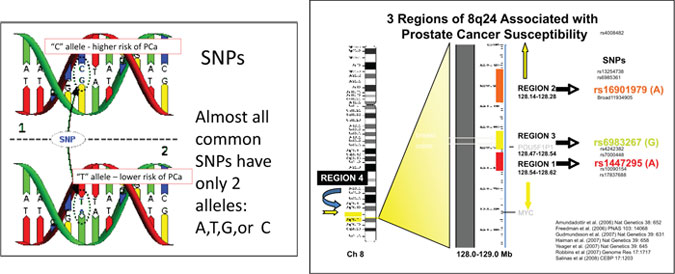Prostate Cancer As An Inherited Disease

A large body of evidence suggests a genetic cause for prostate cancer, a connection stronger than for any other common type of cancer.
Some of these genetic factors may be inherited and others may be acquired during life.
It is estimated that 42% of prostate cancers are due to inherited factors.
The big research goals are to find candidate genes connected to prostate cancer and to discover whether these genes are connected to aggressive or non-aggressive cancer.
In these two areas, the research is promising but still in beginning stages.
My collaborators and I are deeply involved in conducting genetic studies and in sharing that information with other researchers.
In addition to publishing our findings in peer-reviewed journals, we report our findings in QUEST so that the public is aware of our progress and understands the importance of the research.
SNP is a change (a variant) in which a single base
in the DNA differs from the usual base at that position
Recent Studies
Recent studies have identified more than 60 prostate cancer risk SNPs. Various SNPs are common in about 5% of the population but it’s the cumulative effect of multiple prostate cancer risk SNPs that have a numerical effect.
That effect of having multiple risk SNPs accounts for about 25% of prostate cancer risk associated with family history.
So far, the majority of prostate cancer SNPs from GWAS (genome-wide association studies) do not show an association with disease aggressiveness, but it is the risk for aggressive prostate cancer that is most important for treatment decisions.

Search for SNPS
The most important genetic research in prostate cancer for the present is the search for SNPs that show an association with aggressive prostate cancer. The GWAS is trying to use its past findings in prostate cancer risk SNPs in this area of aggressiveness.
While this research is in the beginning stages, some initial results are worth reporting.
In preliminary results of the National Cancer Institute SPORE Genetics Working Group led by Dr. Catalona, using 36 prostate cancer risk SNPS and comparing them in men identified with aggressive prostate cancer and those with non-aggressive cancer, 5 of those SNPs had a statistically significant association with prostate cancer aggressiveness.
Caucasian men who had all 5 SNPs had an almost 5 times increased risk for aggressive prostate cancer.
African-American men had somewhat different results, with 3 genetic variants associated with aggressive prostate cancer.

HOXB13
A study reported in the New England Journal of Medicine looked at a mutation HOXB13 (rs138213197) in a coding region of a gene located on the long arm of chromosome 17.
In the families examined, all 18 men with prostate cancer from these families carried the mutation. Within the carrier families, the mutation was more common in men with prostate cancer than those without prostate cancer.
Most important for continuing study, the clinical characteristics of the prostate cancer in those families included features of high-risk disease.
This particular mutation, HOXB13, may confer aggressiveness.
While this finding could be a basis for early-targeted screening of men at risk for prostate cancer and possibly aggressive prostate cancer, it also shows how complicated genetic research is.
The frequency of HOXB13 mutations was highest in families from Nordic countries and not found in African, Ashkenazi Jewish or other descents.

Direction
Clearly, we have a long way to go in finding genetic biomarkers that can distinguish between aggressive and nonaggressive prostate cancer.
Under my clinical direction and the basic science direction of John Witte, PhD, we are developing a new study to:
- Find ways to identify men with aggressive prostate cancer who are enrolled in active surveillance programs,
- Find novel biomarkers that indicate aggressive prostate cancer,
- Discover cell signaling pathways that would result in potential therapeutic targets, and
- Examine aggressive disease in men of different ethnic backgrounds.







